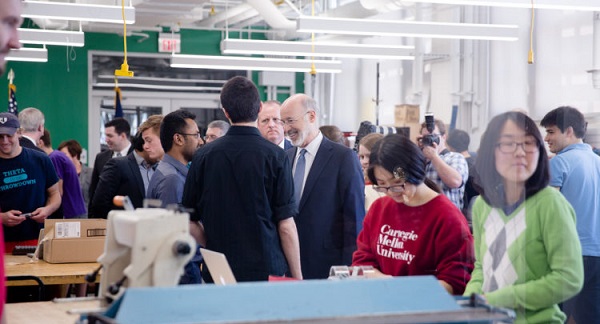
Teen manufacturing summer camps set the stage for Pittsburgh’s future machinists
Photo: Governor Tom Wolf at the launch of the Manufacturing PA Innovation Program in May 2018. Tom Wolf/Flickr.
This story first appeared on NEXTpittsburgh, which publishes Kidsburgh.
This summer, local nonprofits Catalyst Connection and BotsIQ are teaming up with summer camps for Pittsburgh’s budding machinists.
The one-week courses, based in Homewood and Aliquippa respectively, will guide high school students through an online curriculum and coursework developed by the education organization Titans of CNC.
From their home base in Rocklin, Calif., the company provides free, online tutorials and training software on computer numerical control (CNC) manufacturing, a broad term for the automated control of machining tools such as drills and 3D printers.
It was seeing CEO Titan Gilroy speak at the Manufacturing & Technology conference in Pittsburgh this past April that inspired Catalyst Connection CEO Petra Mitchell to spearhead the pilot program.
Scott Dietz, director of workforce initiatives at Catalyst, says the camps — both of which are filled — are meant to support neighborhoods and communities that are underrepresented in manufacturing and underserved in general.
“We’re trying to attract a different group of individuals to manufacturing than maybe we currently have pipelines to,” says Dietz.
The first 15 students will take their course at the University of Pittsburgh’s Manufacturing Assistance Center (MAC) from July 29 through August 2. In addition to working through the Titan Academy courses using MAC’s wide array of equipment, the students will also hear from guest speakers and tour local manufacturing companies.
The next camp, serving 12 students, will run from August 5 through 9 in Aliquippa. Since their host is a local community center with no engineering focus, the students will work on portable equipment and take field trips to Robert Morris University’s manufacturing facilities.
As Dietz explains, he and the other organizers wanted to look at two different models for the camp, one more centralized and one more mobile, as they plot the program going forward.
“We’ll be learning and adjusting on the fly,” he says.
If the camps are deemed successful, Dietz says they will look to expand the scale and scope of the camps next year, and perhaps even adapt the curriculum for after-school programming.
“We’ll see where the pilot takes us,” says Dietz, “and where the community interest takes us.”